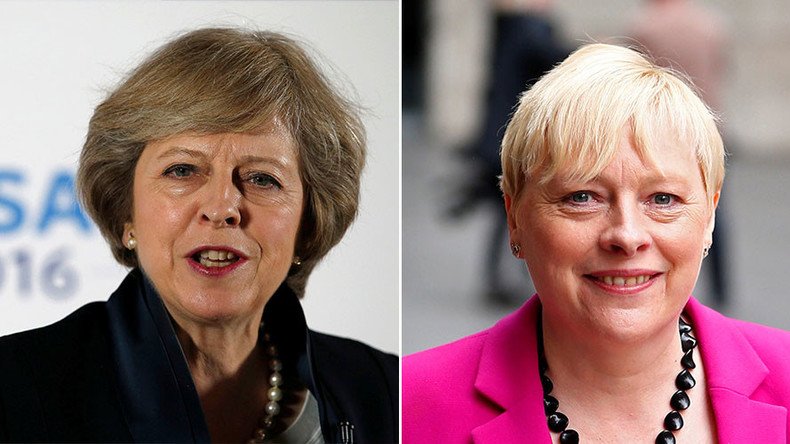Women on top in Westminster, but a defeat for feminism?

Britain’s two most powerful political parties could soon be led by women, with one, Theresa May, now confirmed as the next Conservative prime minister.
Facing her across the Commons could soon be Angela Eagle, who is officially challenging Jeremy Corbyn to take over as Labour leader. If she wins, all but one of Westminster’s parties could soon be headed by women.
But is the potential success of May and Eagle a victory for feminism?
Theresa Mary May
The 59-year-old is one of the most senior politicians in the entire country, having now been the longest running Home Secretary in British history. She has held a series of other cabinet and shadow cabinet positions since becoming MP for Maidenhead in 1997. May was the chairman of the Conservative Party between 2002 and 2003.
But her politics left much to be desired when it came to making women’s lives easier.
In her nearly 20 years in Parliament, May has voted in favor of a series of measures that have made women’s lives in particular more difficult. She was a strong supporter of the burdensome Bedroom Tax and of benefit cuts. May also voted for welfare reforms, including Universal Credit, where all financial support is handed over to a sole family member, dangerously trapping victims of domestic violence by making them financially dependent on their partners.
But importantly it was in the role of Home Secretary that May had most prominence in British politics. And it was in this role too that she made the lives of migrants and asylum seekers all the more unbearable, by tightening migration rules, setting salary thresholds for residency applications and detaining and deporting thousands of people. In a time when Yarl’s Wood Immigration Removal Centre was hit with allegations of physical, emotional and sexual abuse, May renewed the contract of the site’s managing company, Serco.
On why Theresa May is garbage rot for women & feminism, this is a must read by @DawnHFoster: https://t.co/sTpS2pVjmPpic.twitter.com/YlUH6UrF6E
— Catrin Cooper (@catrincooper) July 11, 2016
She also rejected compulsory quotas for refugee intake as suggested by the European Union. Instead, she argued the definition of what a refugee is should be changed.
“There is a huge difference between a young Syrian family fleeing the tyranny of ISIL or Assad, and a student who claims asylum once he has been discovered overstaying his visa, or a foreign criminal about to be sent to a prison in his own country,” May said. “By taking a tougher approach to those who do not need our help, we can give more support to vulnerable people who are in real and urgent need of our protection.”
Can we please also stop the white liberal feminism of championing Theresa May, the most anti-immigration politician in the UK bar Farage?
— Jade Azim (@JadeFrancesAzim) June 30, 2016
Writing in the New Statesman, author Laurie Penny said of her Tory leadership bid: “This is the feminist revolution in the same way that the Charge of the Light Brigade was a military triumph.”
May is expected to become Prime Minister on Wednesday evening, once David Cameron officially leaves Number 10.
Angela (not Maria) Eagle
Angela Eagle has credited Margaret Thatcher for making her want to go into politics – and stop the havoc the former PM was wreaking in Liverpool. She has served under Jeremy Corbyn’s shadow cabinet as George Osborne’s shadow secretary of state. But since the European referendum results came out she resigned her post and delivered a series of threats to the Labour leader, often saying she would stand if he didn’t stand down. Corbyn stayed put and after 15 days of uncertainty Eagle delivered her leadership challenge speech on Monday, suggesting she was neither a “Blairite or a Corbynista.”
Neither Theresa May 'brutalise migrants' feminism nor Angela Eagle 'I'm not Corbyn' feminism,
— QELD (@theqeld) July 4, 2016
Proletarian feminism pic.twitter.com/9xjw4yKZ9r
Her politics, indeed, have swung with the times and she has both opposed Tony Blair’s NHS and education privatization drives, and Corbyn’s nemesis, the Trident nuclear program.
More recently her leadership bid has been questioned as her first intimations came days away from the release of the Chilcot Report. Eagle had voted both in favor of the Iraq War and against an investigation into it. She also voted for Western intervention in Syria, the so-called snooping laws and a proposal by Blair to detain suspects up to 90 days without charge.
Eagle scored no better on social issues, having voted for higher university tuition fees under Tony Blair, but against them while in opposition in 2010. While being shadow leader of the House of Commons, Eagle abstained on the welfare reforms vote, following the line of her now very vocal supporter Harriet Harman.
Angela Eagle's welfare cutting, education destroying warmongering feminism is not one of them
— £1 femme (@spacecommunism) July 11, 2016
Scottish trade union activist Cat Boyd labeled Eagle’s feminism as worse than Corbyn’s. “She abstained on workfare and the Welfare Bill, two monumentally anti-feminist pieces of legislation. She backs Trident. She backed the Iraq War, and has consistently opposed any investigation into its circumstances. Taken together, I think it adds up to a pretty piss- poor feminism”, Boyd told The National.
“Theresa May and Angela Eagle aren’t the final victory of feminism, but more possibly a final defeat. They represent individual women climbing on the backs of yesterday’s struggles to take seats at the top table, kicking the shit out of women at the other end of society as they do it.”
Two of them anti immigration, all pro war, one anti feminism, two back stabbers, just no. #AngelaEagle#TheresaMay#AngelaLeadsom
— Smea Gollum (@smeagollum888) July 9, 2016












